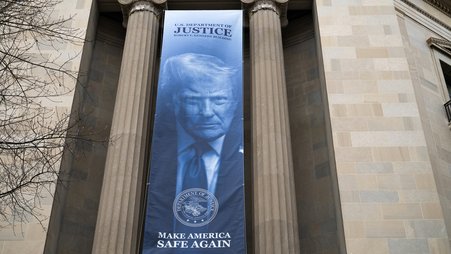Dear Friend of Press Freedom,
It’s been 129 days that Rümeysa Öztürk is facing deportation by the United States government for writing an op-ed it didn’t like, and the 47th day that Mario Guevara has been imprisoned for covering a protest. Read on for more, and click here to subscribe to our other newsletters.
Lose the law license, keep the lapel pin
This week we filed an ethics complaint with the Washington, D.C., attorney disciplinary commission against Federal Communications Commission Chair Brendan Carr, calling for him to be disbarred.
Carr’s approval of the $8 billion merger between Paramount Global and Skydance Media, which came after Paramount agreed to pay President Donald Trump $16 million to settle his frivolous lawsuit, was the last straw. It’s clear that Carr is abusing his power to help the president, whose face he wears as a lapel pin (seriously), use the court system to extract payments that U.S. senators and plenty others have called illegal bribes.
“Trump’s shakedown of Paramount could not have worked without a credible threat that the administration would not approve Paramount’s merger with Skydance unless it paid up,” Freedom of the Press Foundation (FPF) Advocacy Director Seth Stern told Status. “It seems obvious to us that a licensed attorney should not be able to help his boss make a mockery of the legal system by laundering bribes through the courts without consequence.”
FPF sues over Qatari plane secrecy
Two months ago, Attorney General Pam Bondi issued a memo giving the Trump administration permission to accept a $400 million jet from Qatar to use as Air Force One.
The memo argued this was permissible as long as the plane was transferred to the Trump presidential library foundation at the end of Trump’s term. But the document, and Bondi’s basis for that politically convenient conclusion, have never been made public.
FPF, represented by watchdog group American Oversight, filed a Freedom of Information Act lawsuit this week to force the Justice Department to release the memo. Read more here.
Google search exploited to censor reporting on censorship
On a Friday afternoon in mid-June, independent journalist Jack Poulson made a curious discovery: An article that we published about the aggressive attempts of a San Francisco-based tech executive named Maury Blackman to censor Poulson’s reporting about his sealed domestic violence arrest had, itself, disappeared from Google search results.
After Poulson alerted us to the issue, we investigated, and found that the article vanished from Google search because of a novel maneuver that apparently hasn’t been publicly well documented before: a sustained and coordinated abuse of Google’s “Refresh Outdated Content” tool. Now that Google says it has fixed the glitch so it can’t be further exploited, we can reveal what we found. Read more here.
The libel-proof president
Trump’s latest frivolous lawsuit, against The Wall Street Journal over its reporting on his ties to Jeffrey Epstein, faces plenty of legal obstacles.
One of them should be the “libel-proof plaintiff” doctrine, which theorizes that some people are so reputationally damaged, either across the board or on a certain topic, that even false statements about them can’t make it quantifiably worse.
As Stern wrote for The Palm Beach Post, the doctrine is often used against private litigants with long criminal records. That’s a tough sell to judges who believe in rehabilitation, which is likely why the doctrine is rarely applied. A better use may be as an added layer of defense to libel suits by disgraced politicians and public figures like Trump. Read the op-ed here.
What we’re reading
’If You Can Keep It’: Weakening whistleblower protections (NPR). The Trump administration is trying to portray journalism as a threat to national security. FPF’s Lauren Harper debunked these claims on “1A.”
Anna Gomez’s lonely fight (Columbia Journalism Review). Despite the FCC’s obligation to refrain from censorship, Commissioner Anna Gomez says a local station manager instructed reporters to “be extra careful about how they described the administration, because they couldn’t afford to be dragged before the FCC.” Also listen to FPF’s June conversation with Gomez here.
This U.S. citizen recorded an immigration arrest. Officers told him to delete it or face charges. (Reason). The constitutional right to record law enforcement applies equally to immigration officers, and this story shows why.
The fight for free speech goes corporate (Columbia Journalism Review). “People can’t trust a news outlet that is bribing the same officials it’s supposed to hold accountable,” FPF’s Stern said.
A more perfect media (Free Press). Read this new report on corporate influence on the media from Free Press (not the Bari Weiss one). It accompanies their new Media Capitulation Index.





